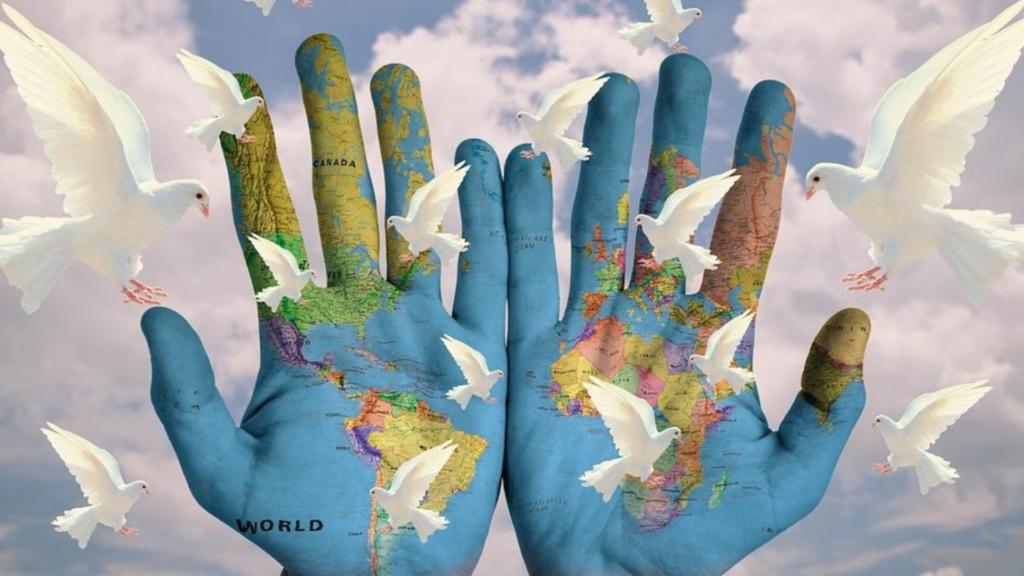
What Does The International Day of Peace Mean to People from Oppressed Lands?
Zakir Hussain Bhat
On the International Day of Peace, observed annually on September 21, the world takes a moment to reflect on the importance of peace and conflict resolution. However, for the people of Kashmir, peace remains an elusive dream, buried under decades of conflict, oppression, and a struggle for self-determination that has yet to see justice. Kashmir is recognized by the United Nations as a disputed territory—a status that remains largely ignored by the international community and overshadowed by geopolitical interests.
The roots of the Kashmir conflict date back to 1947, when the British Raj partitioned the Indian subcontinent into two independent nations: India and Pakistan. Kashmir, a princely state at the time, was given the choice to join either country or remain independent. The Maharaja of Kashmir, Hari Singh, a Dogra Hindu, chose to accede to India against the will of the population who were predominantly Muslim. However, this accession was contested by Pakistan and Kashmiris, leading to the first of several wars over the region and solidifying its status as a flashpoint of conflict between the two nuclear-armed neighbors.
Over the decades, Kashmir has been a witness to extensive human rights violations committed by the Indian military and paramilitary forces. The numbers are staggering: hundreds of thousands of Indian troops are stationed in the region, making it one of the most densely militarized zones in the world. Since 1947, and more intensively since 1989 when an armed struggle was started by Kashmiris, the people of Kashmir have gone through unimaginable suffering. The armed struggle was partly a response to the crushing of democratic aspirations by the Indian state, which rigged elections and installed puppet governments that failed to represent the will of the Kashmiri people.
The Indian military’s actions in Kashmir have been brutal. Tens of thousands of Kashmiris have been killed, often with impunity. Reports of enforced disappearances, extrajudicial killings, and mass graves are common. Over 10,000 cases of enforced disappearances have been documented, with families still searching for their loved ones. The use of rape as a weapon of war by Indian occupying forces is another horrifying aspect of this conflict, with countless Kashmiri women subjected to sexual violence during night raids, crackdowns and CASO’s (Cordon and Search Operations). The situation is so dire that the people of Kashmir live in a constant state of fear and their daily lives are overshadowed by the threat of brute violence.
On August 5, 2019, the Indian government, led by the Bharatiya Janata Party (BJP), unilaterally abrogated Article 370, stripping Kashmir of its semi-autonomous status. This move was widely condemned, both within India and internationally. Following this abrogation, a severe lockdown was imposed on the region, accompanied by mass arrests, a communication blackout, and a strict curfew. While the restrictions were officially lifted after several months, a de facto curfew still continues in various shapes and forms. The abrogation also paved the way for a dangerous settler colonial project, with new laws allowing non-Kashmiris to buy land in the region, thereby threatening to alter the demographic composition of Kashmir permanently.
This demographic engineering is seen by many as an attempt to change the Muslim-majority character of the region. It is no secret that the faith of the inhabitants of this region is under direct assault from the Indian state. Land is being seized under various pretexts, homes and businesses are being demolished, and anyone who dares to speak out against the state is silenced, often violently. The media in Kashmir has been muzzled, with journalists routinely harassed, detained, or worse, under the pretext of “national security”. In this climate of fear and repression, the very idea of peace seems like a cruel joke.
The United Nations, which has passed no less than 18 resolutions on Kashmir, has failed to enforce a single one. These resolutions call for a plebiscite to allow the Kashmiri people to decide their own fate—a promise that has been reneged on time and again. The international community, distracted by its own interests and wary of antagonizing India, has largely turned a blind eye to the ongoing atrocities. The world’s failure to act is not just a political oversight; it is a moral failing of colossal proportions.
On this International Day of Peace, Kashmiris will, like they have always, tell India that peace cannot be imposed through the barrel of a gun or the crushing of a people’s legitimate aspirations but what about those world institutions and people who observe this day enthusiastically? Injustice anywhere in the world is a threat to peace to everywhere. It should not be all about the peace around yourself or in certain geographical spaces. The powerful institutions across the globe and nation states that were built on the principles of justice and liberation must introspect as to why they failed the people of Palestine and Kashmir.
The people of Palestine and Kashmir have been fighting the forces of evil since decades. Their struggle is not just against occupying forces but against the silence and apathy of a world that has chosen convenience over justice.
The issue of Palestine and Kashmir is a litmus test for the international community’s commitment to human rights and peace. If the world continues to ignore these regions, the very principles that the International Day of Peace stands for—freedom, justice, and dignity for all—are rendered meaningless. It is high time that the world takes a stand, not just in words but in actions, to ensure that the people of such god forsaken lands can live in peace, with the freedom to decide their own future.



